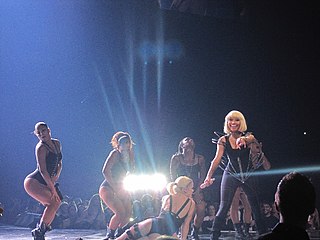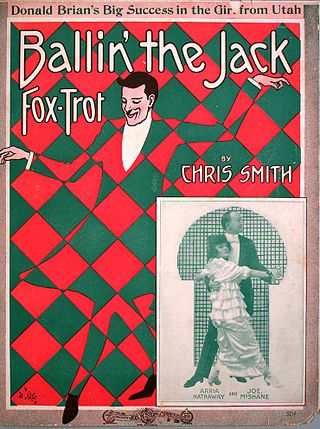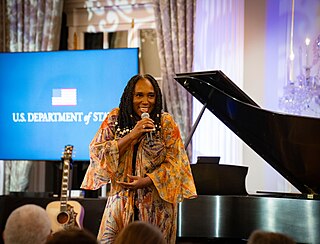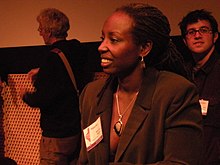
Dana Elaine Owens, better known by her stage name Queen Latifah, is an American rapper, singer, and actress. She has received various accolades, including a Grammy Award, a Primetime Emmy Award, a Golden Globe Award, three Screen Actors Guild Awards, and two NAACP Image Awards, in addition to a nomination for an Academy Award. In 2006, she became the first hip hop artist to receive a star on the Hollywood Walk of Fame.
Call and response is a form of interaction between a speaker and an audience in which the speaker's statements ("calls") are punctuated by responses from the listeners. This form is also used in music, where it falls under the general category of antiphony.

Beat Street is a 1984 American dance drama film featuring New York City hip hop culture of the early 1980s. Set in the South Bronx, the film follows the lives of a pair of brothers and their group of friends, all of whom are devoted to various elements of early hip hop culture, including breakdancing, DJing and graffiti.

A clapping game is a type of usually cooperative game which is generally played by two players and involves clapping as a rhythmic accompaniment to a singing game or reciting of a rhyme, often nursery rhymes. Clapping games are found throughout the world and similar games may be known throughout large areas with regional variation.
Girl power is a slogan that encourages and celebrates women's empowerment, independence, confidence and strength. The slogan's invention is credited to the US punk band Bikini Kill, who published a zine called Bikini Kill #2: Girl Power in 1991. It was then popularized in the mainstream by the British girl group Spice Girls in the mid-1990s. According to Rolling Stone magazine, the Spice Girls' usage of "girl power" was one of the defining cultural touchstones that shaped the Millennial generation, particularly during their childhood in the 1990s. However, since the maturing of older Millennials in the late 2000s, it has increasingly been dropped in favor of challenging real-world sexism that has become mainstream as of Generation Z's maturing of the 2020s.
Hip hop music arrived in Cuba via radio and TV broadcasts from Miami. During the 1980s hip hop culture in Cuba was mainly centered on breakdancing. But by the 1990s, with the collapse of the Soviet Union and the onset of the Special Period, young raperos, exposed to foreign tourists whose wealth highlighted their struggle, turned to rapping to affirm their cubanidad and advocate for further revolutionary reforms.

"Mary Mack" is a clapping game of unknown origin. It is first attested in the book The Counting Out Rhymes of Children by Henry Carrington Bolton (1888), whose version was collected in West Chester, Pennsylvania. It is well known in various parts of the United States, Australia, Canada, United Kingdom and in New Zealand and has been called "the most common hand-clapping game in the English-speaking world".

"Can't Hold Us Down" is a song recorded by American singer Christina Aguilera and rapper Lil' Kim for the former's fourth studio album, Stripped (2002). It was released by RCA Records on July 8, 2003, as the fourth single from the album. The track was written and produced by Scott Storch, with additional songwriting by Aguilera and Matt Morris. An R&B and hip hop song with a dancehall outro, "Can't Hold Us Down" criticizes gender-related double standards.

A video vixen is a woman who models and appears in hip hop-oriented music videos. From the 1990s to the early 2010s, the video vixen image was a staple in popular music, particularly within the genre of hip hop. The video vixen first came around in the late 1980s when the hip-hop culture began to emerge into its own lifestyle, although was most popular in American popular culture during the 1990s and 2000s. Many video vixens are aspiring actors, singers, dancers, or professional models. Artists and vixens have been criticized for allegedly contributing to the social degradation of black women and Latinas.

Double Dutch is a game in which two long jump ropes turning in opposite directions are jumped by one or more players jumping simultaneously. It is believed to have originated among Dutch immigrants in New York City, although it has been a popular school playground game for much longer than that in the Netherlands, and is now popular worldwide. While it had long been a popular street activity for African American girls in New York City, the modern sport of Double Dutch originated in the early 1970s with NYPD officers Ulysses Williams and David Walker, who formalized the rules for competition. The first official competition was held in 1974. Competitions in Double Dutch range from block parties to the world level. During the spring of 2009, Double Dutch became a varsity sport in New York City public high schools.

Hip Hop Harry is an American children's television series created by Claude Brooks that aired on Discovery Kids and TLC as part of the Ready Set Learn block from September 25, 2006 to June 26, 2008. Similar to PBS Kids series such as Barney & Friends, Kidsongs, Sesame Street, Hi-5, Teletubbies and The Wiggles, Hip Hop Harry is a live-action program aimed at younger children ranging from around 2–7 years old. The program uses age-appropriate hip hop music and dance to teach social, educational, physical and creative skills.
"Bitches Ain't Shit" is the final song of Dr. Dre's debut solo rap album, The Chronic, which was released in December 1992 as Death Row Records' first album. Though never a single, "Bitches Ain't Shit" was a huge underground hit. The song's popularity was a major contribution to the success of The Chronic's sales.

"Ballin' the Jack" is a popular song from 1913 written by Jim Burris with music by Chris Smith. It introduced a popular dance of the same name with "Folks in Georgia's 'bout to go insane." It became a ragtime, pop, and traditional jazz standard, and has been recorded hundreds of times.
Misogyny in rap music is defined as lyrics, videos, or other components of rap music that encourage, glorify, justify, or legitimize the objectification, exploitation, or victimization of women. It is an ideology that depicts women as objects for men to own, use, and abuse. It reduces women to expendable beings. It might include everything from innuendos to stereotypical characterizations and defamations.

Toni Blackman is an American rapper and writer who was the first hip-hop ambassador to the U.S. State Department. Additionally, she was selected as a 2006 Rhythm Road touring artist and subsequently served as on the selection committee for American Music Abroad with American Voices.
Hip hop feminism is a sub-set of black feminism that centers on intersectional subject positions involving race and gender in a way that acknowledges the contradictions in being a black feminist, such as black women's enjoyment in hip hop music and culture, rather than simply focusing on the victimization of black women in hip hop culture due to interlocking systems of oppressions involving race, class, and gender.
Feminist activism in hip hop is a feminist movement based by hip hop artists. The activism movement involves doing work in graffiti, break dancing, and hip hop music. Hip hop has a history of being a genre that sexually objectifies and disrespects women ranging from the usage of video vixens to explicit rap lyrics. Within the subcultures of graffiti and breakdancing, sexism is more evident through the lack of representation of women participants. In a genre notorious for its sexualization of women, feminist groups and individual artists who identify as feminists have sought to change the perception and commodification of women in hip hop. This is also rooted in cultural implications of misogyny in rap music.
Girl studies, also known as girlhood studies, is an interdisciplinary academic field of study that is focused on girlhood and girls' culture that combines advocacy and the direct perspectives and thoughts of girls themselves. The field emerged in the 1990s after decades of falling under the broader field of women's studies. Scholars within girl studies examine social and cultural elements of girlhood and move away from an adult-centered focus. Those working in the field of girl studies have studied it primarily in relation to other fields that include sociology, psychology, education, history, literary studies, media studies, and communication studies. Girl studies seeks to work directly with girls themselves in order to analyze their lives and understand the large societal forces at play within them. Scholars in girl studies also explore the connection the field has to women's studies, boyhood studies, and masculinity studies. There are many different definitions of what a girl is. Some may say that a girl is under the age of 18. Catherine Driscoll discusses how in the nineteenth century, girls were traditionally defined as younger than the age of consent. Claudia Mitchell and Jacqueline Reid-Walsh discuss girlhood beginning from birth to late twenties. Girlhood is often designated by age and consists of imitating observed and learned adult behavior.
Mellonee Victoria Burnim is an American ethnomusicologist. A professor emerita at Indiana University Bloomington who specializes in African American gospel music, she previously served as director of the university's Archives of African American Music and Culture.
Ratchet feminism emerged in the United States from hip hop culture in the early 2000s, largely as a critique of, and a response to, respectability politics. It is distinct from black feminism, womanism, and hip hop feminism. Ratchet feminism coopts the derogatory term (ratchet). Other terms used to describe this concept include ratchet womanism as used by Georgia Tech professor Joycelyn Wilson or ratchet radicalism used by Rutgers professor Brittney Cooper. Ratchet is an identity embraced by many millennials and Gen Z black women and girls. The idea of ratchetness as empowering, or of ratchet feminism, has been articulated by artists and celebrities like Nicki Minaj, City Girls, Amber Rose, and Junglepussy, scholars like Brittney Cooper and Mikki Kendall, and through events like Amber Rose's SlutWalk. Many view ratchet feminism as a form of female empowerment that doesn't adhere to respectability politics.











